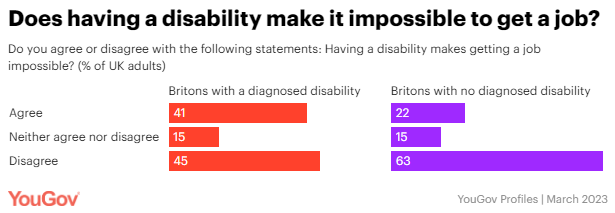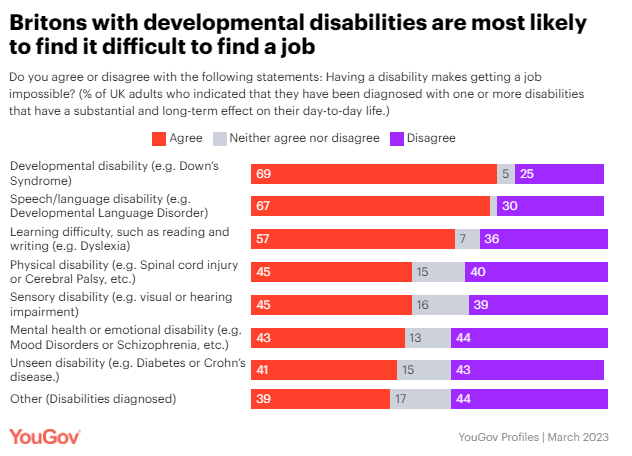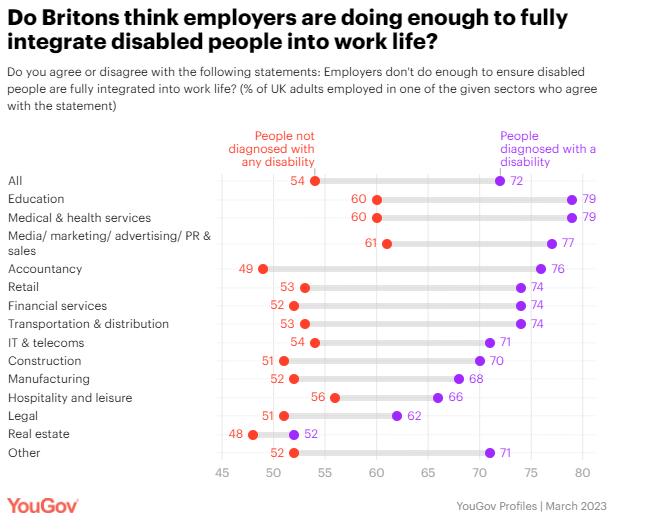- More than three-fifths of Britons with developmental disabilities such as Down’s Syndrome (69%) and speech or language difficulties (67%) say that having a disability makes it impossible for them to find a job
- Six in ten (57%) of Britons with learning disabilities such as dyslexia share the same opinion
- People diagnosed with mental health or emotional disabilities like mood disorders (41%) and unseen disabilities like diabetes (39%) find it easier to get a job compared to other disabled Britons
- Britons who have a diagnosed disability (41%) are almost twice as likely than non-disabled Britons (22%) to agree that having a disability makes it impossible to find a job
Data collected from YouGov Profiles, March 2023
According to latest data from YouGov Profiles, Britons who have a diagnosed disability (41%) are almost twice as likely than non-disabled Britons (22%) to agree that having a disability makes it impossible to find a job.

Breaking down the impact of different disabilities on a person’s ability to look for employment reveals some interesting differences.
The data reveals that people diagnosed with mental health or emotional disabilities like mood disorders (41%) and unseen disabilities like diabetes (39%) find it easier to get a job compared to other disabled Britons.
On the other hand, more than three-fifths of Britons with developmental disabilities like Down’s Syndrome (69%) and speech or language disabilities (67%) say that disabilities make it impossible to find a job. 57% of Britons with learning disabilities like dyslexia share the same opinion.

Simply recognising the difficulties faced by disabled Britons as they look for employment is, however, unlikely to solve the issue for these groups. It is also important to ask if employers across industries and sectors are doing enough to integrate people with a disability into the workforce.
And, possibly unsurprisingly, nearly three-quarters of Britons diagnosed with a disability (72%) say that employers don’t do enough to ensure people with a disability are fully integrated into work life compared to slightly more than half of our non-disabled respondents (54%).

Nearly four out of five Britons with a disability employed in the education (79%), medical and health services (79%) and media, marketing and PR (77%) sectors say that employers don’t do enough to integrated people with a disability into work life, compared to those workers without a disability (60%, 60%, and 61%, respectively).
The accountancy sector registers the widest gap between disabled workers (76%) and non-disabled workers (49%) who think employers aren’t doing enough to fully integrate people with disabilities.
Sectors like retail (non-disabled Britons, 53% vs. Britons with a disability, 74%), transportation (non-disabled Britons, 53% vs. Britons with a disability, 74%), IT & telecoms (non-disabled Britons, 54% vs. Britons with a disability, 71%) and construction (non-disabled Britons, 51% vs. Britons with a disability, 70%) register similarly wide gaps.
Real estate is the only sector that stands out. Though a majority of our respondents with a disability (52%) say that employers in this sector don’t do enough to fully integrate people with disabilities into work life, a substantial proportion believe the opposite (33%). It is also one of the only sectors where our non-disabled respondents register opinions similar to their counterparts with a disability.
While the government continues onwards on its strategy of ‘Improving lives: the future of work, health and disability’, the role of organisations in reducing the disability employability gap cannot be forgotten. And, as indicated by the data, there is work yet to be done.
Methodology: YouGov Profiles is based on continuously collected data and rolling surveys, rather than from a single limited questionnaire. Profiles data for the UK is nationally representative and weighted by age, gender, education, region, and race.






